| Srl | Item |
| 1 |
ID:
139679
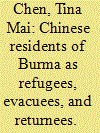

|
|
|
|
|
| Summary/Abstract |
This article analyses how, at the time of the Japanese military expansion across Asia in the 1930s and 1940s, the category of ‘Burma Chinese’ and notions of ‘Chineseness’ acquired meaning through the movement across Chinese and Indian borders of residents of Burma identified as Chinese. Focusing on the terminology utilized by various reporting organizations to refer to evacuees, refugees or returnees, this article asks what we can learn from bureaucratic exchanges and practices of documentation about the wartime migration of Burma Chinese. I argue that a shared racial logic of territorialization operates across divergent sets of correspondence concerned with the repatriation of Burma Chinese to Burma. Multiple acts of iteration and practical implementation of categories naturalized this racial logic with respect to Burma Chinese in the latter half of the 1940s. Understanding how the work of repatriating Burma Chinese rested upon a shared racial logic is important because the regulation of Asian wartime migration was foundational to the emerging international refugee regime and post-Second World War world order.
|
|
|
|
|
|
|
|
|
|
|
|
|
|
|
|
| 2 |
ID:
107538
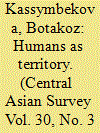

|
|
|
|
|
| Publication |
2011.
|
| Summary/Abstract |
This article re-evaluates the history of internal resettlement in Soviet Tajikistan in the 1920s and early 1930s. Rather than a purely 'economic' measure, as the policy has thus far been identified by historians, the programme of internal resettlement had political and military rationales to secure the republic's southern plains bordering Afghanistan. These territories were considered by Soviet leaders to be insecure and under threat. By pointing to the role of ethnic categories in organizing the resettlement and the violent manner in which the policy was conducted, the author analyses state leaders' attempts to ethnicize territories and populations in order to identify, naturalize and secure allies, within and beyond Tajikistan. Tajikistan's resettlement had internal as well as foreign-policy objectives to secure the Soviet Union's border regions as well as to spread Soviet influence abroad.
|
|
|
|
|
|
|
|
|
|
|
|
|
|
|
|
| 3 |
ID:
145042
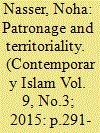

|
|
|
|
|
| Summary/Abstract |
Today’s cosmopolitan Western City contains large numbers of sub-cultures within its neighbourhoods, streets and buildings that are re-configuring the norms of citizenship and place. This paper examines the role of citizenship as a sense of cultural identity, territorial belonging and place attachment in the building of three mosques in Adelaide across a 100-year time span. Starting with the colonial period and the building of the first mosque in Australia up until the post-colonial period of large-scale Muslim immigration to Australia, the paper demonstrates the forms of social organization and patronage that were created as a strategy for collective action to make the building of these mosques possible. Set against the marginal political position of Muslims in Australia throughout this period, this paper shows the creativity of social and resource mobilization to stake a claim for the ownership of land in the Western City and to define a Muslim ethnic boundary.
|
|
|
|
|
|
|
|
|
|
|
|
|
|
|
|
| 4 |
ID:
156664
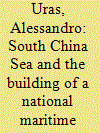

|
|
|
|
|
| Summary/Abstract |
This article investigates the nationalistic rhetoric disseminated by the Chinese political elite regarding the South China Sea, exploring how this political discourse contributed to building a collective consciousness of the sea among Chinese citizens and to creating a new maritime province.
|
|
|
|
|
|
|
|
|
|
|
|
|
|
|
|
| 5 |
ID:
139437
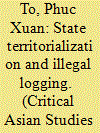

|
|
|
|
|
| Summary/Abstract |
In spite of a government logging ban and wide deployment of forest protection staff, illegal logging persists in Vietnam. This article delves into this apparent paradox, examining the dynamic relationship between state governing practices and illegal logging. Using the lens of “territorialization” and taking a historical view, the author argues that the present logging ban should be understood as one element of a range of state territorial strategies that have been implemented since the beginning of the postcolonial era – strategies that have all aimed to control local people's access to forest resources. The author explains that in the 1950s–1980s, the government officially excluded local people from accessing forest resources, particularly timber; but then, following the doi moi (renovation) in the 1980s, it launched a “regulated inclusion” of local people. In this analysis, I show how state territorialization, including the logging ban, works to create spaces of state control that can then be used to generate informal rents, both materially and discursively, for state actors. These rents in turn bolster the state in myriad ways. However, various discrepancies emerge in the process, for example between state images and practices and between different levels of state administration.
|
|
|
|
|
|
|
|
|
|
|
|
|
|
|
|
| 6 |
ID:
075664
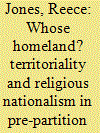

|
|
|
|
|
| Publication |
2006.
|
| Summary/Abstract |
Scholarly inquiries into communalism in South Asia have often exclusively focused on politically constructed religious and ethnic identity categories. This article challenges these assumptions by arguing that territoriality and the designation of homelands played an important, but largely unrecognized, role in developing social and political boundaries in the region. By analyzing the writings of Bipin Chandra Pal during the Swadeshi period, this article points to the territorialization of a Hindu-based version of the national homeland as a key process in the development of communal difference in Bengal and South Asia more generally. It is concluded that the Hindu-dominated rhetoric of the early nationalist movement implicitly marked Hindus as the only true members of the nation. By implicitly excluding all other forms of social affiliations from the narrative of the homeland, it is argued that the stage was set for the contestation of territorial identity categories that played out through the 20th century in Bengal.
|
|
|
|
|
|
|
|
|
|
|
|
|
|
|
|